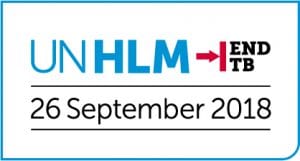UN High-Level Meeting on Tuberculosis
The 2018 first ever UN High-Level Meeting on Tuberculosis (UN HLM TB) is a historic opportunity to mobilize political leadership, increased investments and bold new action to turn end the epidemic of TB.
Introduction
2018 may be remembered as a watershed year in global health. Not one but two high-level meetings are to be held at the UN General Assembly in September to reinvigorate political commitment and spark renewed efforts by countries and the UN system to tackle tuberculosis and NCDs. The parallel processes of preparation for and follow-up on both high-level meetings will elevate health and make it the priority it should be on the agenda of world leaders for years to come.
For tuberculosis, this is the first ever UNGA High-Level Meeting on the fight against TB. TB is responsible for more deaths than HIV and malaria, but has not received the same attention and political commitment. The first WHO Global Ministerial Conference on Ending TB, held in Moscow in November 2017, was a first step and the UN HLM on TB will be critical to drive efforts to end this top infectious killer. It provides a crucial opportunity to mobilize political leadership and new resources and action to improve the lives of people affected by TB worldwide.
Alcohol as a risk factor for TB
Evidence shows that alcohol use, alcohol dosage and alcohol-related problems are all associated with an increased risk of tuberculosis. In fact, alcohol use increases the risk of TB threefold, and is also a strong risk factor for poor TB treatment adherence. That simply means Alcohol is an important population level risk factor for TB, and it often is a common co-morbidity among TB patients.
#1 Advocacy Priority
BOOST TB INVESTMENT BY MAKING FULL USE OF THE ALCOHOL POLICY BEST BUYS
Rationale
The three alcohol policy best buys hold considerable and largely untapped potential to help increasing financial resources for and scaling up investment in efforts to end TB.
TB cannot be eliminated with existing resources in TB care and R&D. Without significant investment in the efforts to end TB, the disease is estimated to cost the global economy nearly $1 trillion by 2030.Scientific evidence clearly shows that the alcohol policy best buys provide an excellent option for increasing financial resources to help end TB. Especially alcohol taxation is a powerful tool for resource mobilization. And investments in the alcohol policy best buys are show to be very cost-effective and high- impact.
A $1 investment in the alcohol policy best buy measures generates a return of $9 dollars.
Advocacy asks
- Increase and meet the financing needs of the global efforts to en TB from all sources, including domestic, bilateral, multilateral and innovative financing by 2030.
- Enact and increase alcohol taxation as a proven best buy measure to raise domestic resources, reduce alcohol harm and in doing so reduce the TB burden.
- Implement the three alcohol policy best buys to address alcohol as a major TB risk factor and as long-term, sustainable, cost-effective investment in TB reduction and health promotion.
#2 Advocacy Priority
CLOSE THE TB TREATMENT GAP BY ADDRESSING ALCOHOL AS TB RISK FACTOR
Rationale
Alcohol use increases the TB risk threefold, is a strong risk factor for poor TB treatment adherence and is a severe driver of co-morbidities, such as in persons with TB and an alcohol use disorder.
40% of people with TB go undiagnosed or unreported every year, Between 2018 and 2022, 40 million people will need quality care – including people with alcohol use disorders.
To effectively close existing gaps in TB diagnosis, treatment, care, and prevention it is imperative to improve screening and brief interventions for alcohol use disorders among TB patients; and to better identify TB in person with alcohol use disorders.
Advocacy asks
- Coherently address alcohol as major risk factor for tuberculosis.
- Increase the provision of screening and brief interventions for alcohol use disorders and co-morbidities.
- Invest in the provision of comprehensive care packages through systematically identifying co-morbidities and providing effective help and care.
#3 Advocacy Priority
PROTECT EFFORTS TO END TB FROM INCOMPATIBLE PARTNERSHIPS AND SAFEGUARD AGAINST CONFLICTS OF INTEREST
Rationale
In the era of the Agenda 2030, effective partnerships across sectors are critical for sustainable progress. But not all partnerships are conducive to reaching the SDGs. Some partnerships are laden with conflicts of interest, like the case of the Global Fund partnering with the world’s second largest beer producer Heineken exposed.
The alcohol industry has a fundamental conflict of interest with regard to SDG 3 in general and SDG 3.8 specifically. Therefor, partnerships with the alcohol industry to help end TB are incompatible.
Advocacy asks
- Put affected people and communities at the center of all efforts, be rights-based, and enable a model of person-centered care and prevention.
- Safeguard the TB response against conflicts of interest, avoid undue influence of the alcohol industry and refrain from incompatible partnerships.
- Identify the alcohol industry as a commercial determinant of the tuberculosis epidemic.

